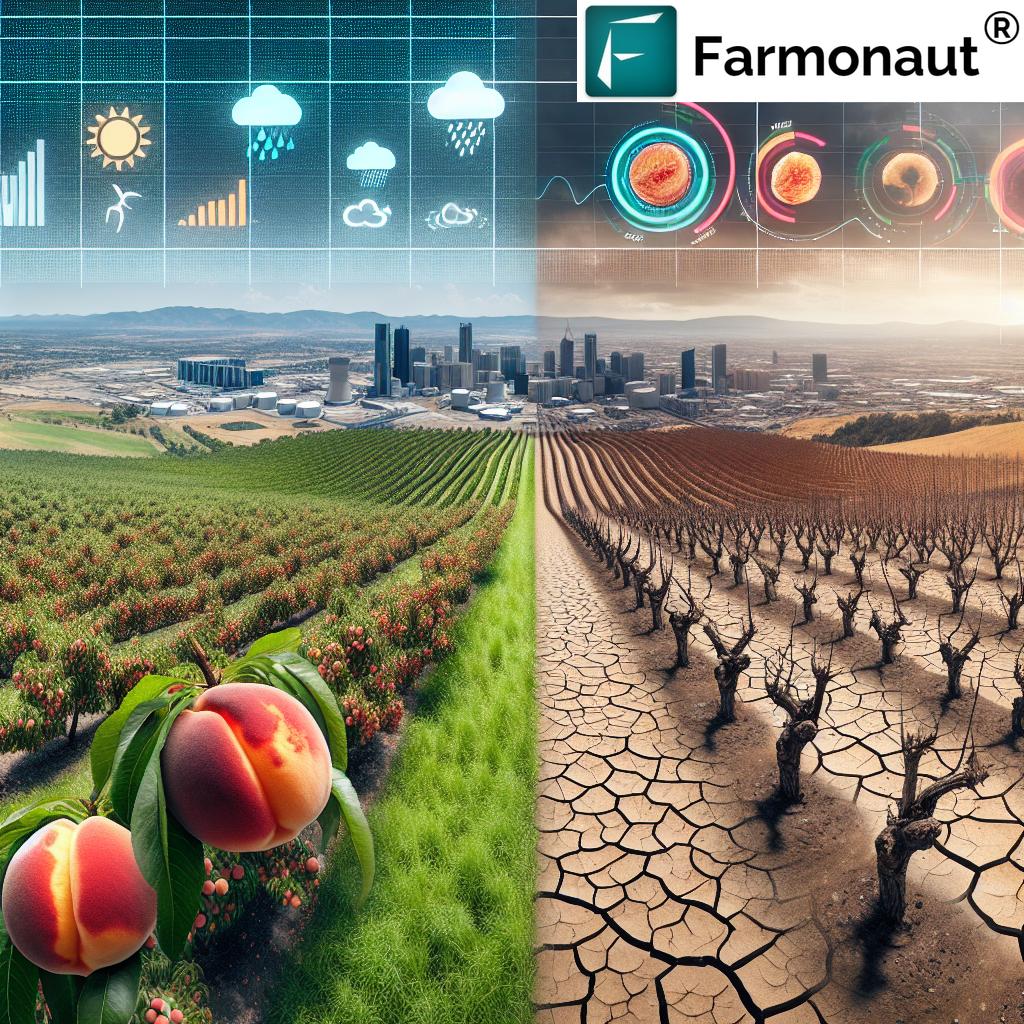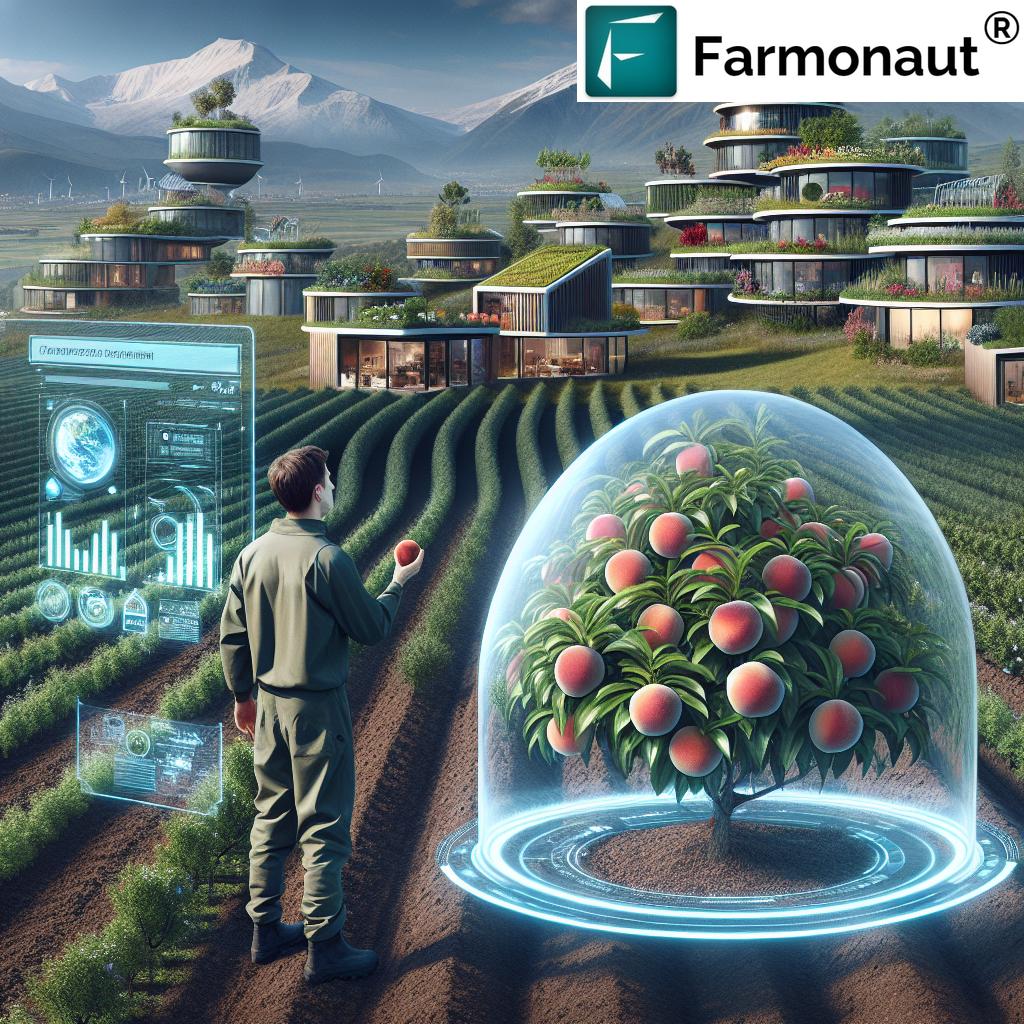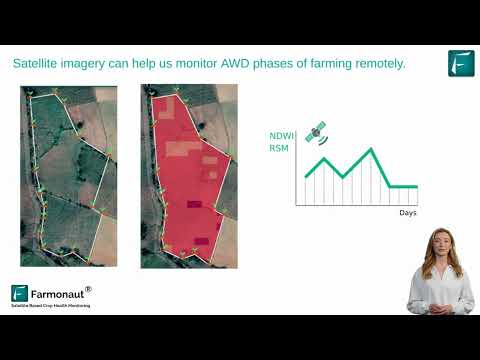Georgia’s Peach Farms Face Climate Change: Innovative Solutions and Sustainable Living Trends
“Georgia peach farmers face up to 30% yield loss due to climate change-induced late frosts and erratic rainfall.”
Climate change is reshaping the agricultural landscape of Georgia, and nowhere is this more evident than in the state’s iconic peach orchards. As we delve into the challenges faced by peach farmers and explore innovative solutions, we’ll uncover how sustainable agriculture and modern living trends are intertwining to create a resilient future for Georgia’s beloved fruit.
The Peach State’s Predicament
Georgia, affectionately known as the Peach State, has long been synonymous with sweet, juicy peaches that epitomize the taste of summer. However, climate change is threatening this cherished tradition, forcing farmers to adapt to increasingly unpredictable weather patterns and rising temperatures.

In Fort Valley, the heart of Georgia’s peach country, third-generation farmers like Sarah Jenkins are grappling with a new reality. “Our peaches need a delicate balance of warm days and cool nights,” Sarah explains. “But with hotter summers and erratic frost patterns, we’re seeing significant impacts on our crops.”
Climate Change Impact on Agriculture: A Closer Look
The effects of climate change on Georgia’s peach industry are multifaceted:
- Unpredictable Weather: Late frosts can damage blooms, while unseasonably warm winters fail to provide the necessary chill hours for proper bud development.
- Erratic Rainfall: Periods of drought followed by intense storms disrupt irrigation schedules and can lead to fruit splitting.
- Rising Temperatures: Hotter summers stress trees and can reduce fruit quality.
- Increased Pest Pressure: Warmer winters allow pests to survive and proliferate, leading to greater crop damage.
Dr. Emily Carter, an agricultural scientist from the University of Georgia, emphasizes the gravity of the situation: “The climate disruptions we’re seeing are threatening the very core of peach farming. It’s not just about reduced yields; it’s about the long-term viability of an industry that’s integral to Georgia’s identity and economy.”
Sustainable Farming Practices: Adapting to Change
In the face of these challenges, Georgia’s peach farmers are not standing idle. They’re embracing innovative crop management techniques and sustainable farming practices to ensure the survival of their orchards.
Weather-Resistant Fruit Varieties
One promising avenue is the development and adoption of weather-resistant peach varieties. These new cultivars are bred to withstand a wider range of temperatures and require fewer chill hours, making them more resilient to climate fluctuations.
Water Conservation in Farming
Water management is crucial in the face of erratic rainfall. Farmers are implementing advanced irrigation systems that use soil moisture sensors and weather data to optimize water usage. Some are even exploring rainwater harvesting techniques to supplement their water supply during dry spells.
Explore how Farmonaut’s satellite-based solutions can help with efficient water management. Try our web app or get started with our mobile apps:
High-Density Planting
To maximize land use and improve crop yields, many farmers are turning to high-density planting techniques. This approach allows for more trees per acre and can lead to earlier production, helping offset losses from climate-related events.
Precision Agriculture Technologies: The Future of Farming
The integration of precision agriculture technologies is revolutionizing how peach farmers manage their orchards. These tools provide data-driven insights that enable more efficient resource use and better decision-making.
Farmonaut’s advanced remote sensing technology is at the forefront of this agricultural revolution. By utilizing satellite imagery and AI-powered analytics, Farmonaut provides farmers with real-time data on crop health, soil moisture levels, and weather patterns. This information is crucial for implementing climate-resilient farming techniques and optimizing crop management strategies.
Interested in leveraging satellite data for your farm? Check out Farmonaut’s API or read our API Developer Docs for integration options.
Economic Impact: Adapting for Survival
The challenges faced by Georgia’s peach industry have far-reaching economic implications. The industry supports thousands of jobs and generates significant revenue for the state. As farmers invest in new technologies and adapt their practices, they’re not just preserving a crop – they’re safeguarding livelihoods and a vital part of Georgia’s economy.
| Climate Change Challenge | Impact on Peach Farming | Adaptation Strategy | Farmonaut’s Solution |
|---|---|---|---|
| Unpredictable Weather Patterns | 20-30% yield reduction due to bloom damage | Weather-resistant varieties, protective netting | Real-time weather forecasting and alerts |
| Rising Temperatures | 15-25% decrease in fruit quality | Shade cloth, evaporative cooling systems | Temperature mapping for targeted interventions |
| Erratic Rainfall | Up to 40% increase in irrigation needs | Drip irrigation, rainwater harvesting | Soil moisture monitoring and irrigation scheduling |
| Late Frosts | 50-70% crop loss in severe cases | Frost fans, orchard heaters | Frost risk prediction and management advice |
| Increasing Pest Pressure | 10-20% increase in pest-related damage | Integrated Pest Management (IPM) | Early pest detection through vegetation health analysis |
The Rise of Tiny Homes: A Surprising Connection
“The tiny home movement in Georgia has grown by 40% as a sustainable living solution amidst agricultural challenges.”
As Georgia’s agricultural landscape evolves, an unexpected trend is gaining traction: the rise of tiny homes. This movement towards compact, efficient living spaces is reshaping the state’s suburban and rural areas, offering a unique solution to the challenges posed by climate change and economic pressures.

Sustainable Living in Compact Spaces
Tiny homes, typically ranging from 100 to 400 square feet, embody the principles of minimalism and sustainability. These dwellings offer several advantages:
- Reduced environmental footprint
- Lower energy consumption
- Affordable housing option
- Flexibility in location
For some peach farmers, tiny homes present an opportunity to reduce living expenses, allowing them to invest more in climate-resilient farming practices. David Miller, a tiny home builder in Atlanta, notes, “We’re seeing increased interest from agricultural communities. These homes allow people to live comfortably while minimizing their impact on the land they cherish.”
Zoning and Regulation Challenges
Despite their growing popularity, tiny homes face zoning and regulatory hurdles in many parts of Georgia. However, as the movement gains momentum, some communities are revising their policies to accommodate these innovative dwellings, recognizing their potential to address housing affordability and environmental concerns.
Agricultural Adaptation Strategies: Lessons from Tiny Living
The principles behind tiny homes – efficiency, sustainability, and adaptability – are increasingly relevant to the agricultural sector. Farmers are finding creative ways to apply these concepts to their operations:
- Resource Optimization: Just as tiny homes maximize space efficiency, farmers are optimizing land use through techniques like vertical farming and high-density planting.
- Energy Independence: Many tiny homes incorporate renewable energy sources, inspiring farmers to explore solar and wind power options for their operations.
- Water Conservation: The water-saving techniques used in tiny homes are being scaled up for agricultural applications, such as advanced drip irrigation systems.
Innovative Crop Management: Embracing Technology
As Georgia’s peach farmers adapt to changing conditions, they’re increasingly turning to innovative crop management techniques powered by cutting-edge technology. Farmonaut’s satellite-based solutions are at the forefront of this agricultural revolution, offering farmers unprecedented insights into their orchards.
Real-Time Crop Health Monitoring
Farmonaut’s platform utilizes multispectral satellite imagery to provide farmers with up-to-date information on crop health. This technology allows for early detection of stress factors, enabling timely interventions to prevent yield losses.
AI-Powered Advisory Systems
The Jeevn AI advisory system, developed by Farmonaut, analyzes satellite data alongside other environmental factors to deliver personalized recommendations. This AI-driven approach helps farmers make informed decisions about irrigation, fertilization, and pest management, optimizing resource use and improving crop resilience.
Blockchain for Traceability
In an era where consumers are increasingly conscious about the origin of their food, Farmonaut’s blockchain-based traceability solutions offer peach farmers a way to showcase their sustainable practices. This technology creates a transparent record of the peaches’ journey from orchard to market, building trust and potentially opening new premium markets for Georgia’s peaches.
Ready to revolutionize your farming practices? 
The Future of Georgia’s Peach Industry
As we look to the future, the resilience of Georgia’s peach industry will depend on the successful integration of sustainable farming practices, innovative technologies, and adaptive living solutions. The synergy between agricultural adaptation and trends like tiny homes points to a future where sustainability isn’t just a goal, but a way of life.
While challenges remain, the spirit of innovation demonstrated by Georgia’s farmers and homeowners offers hope. By embracing new ideas and technologies, we can work towards ensuring that the sweet scent of Georgia peaches continues to be a part of our summers for generations to come.
Frequently Asked Questions
- How is climate change affecting Georgia’s peach farms?
Climate change is causing unpredictable weather patterns, including late frosts and erratic rainfall, which can damage peach blossoms and reduce yields. Rising temperatures are also altering growing seasons and increasing pest pressures. - What are some sustainable farming practices being adopted by peach farmers?
Farmers are implementing water conservation techniques, experimenting with weather-resistant peach varieties, using high-density planting, and adopting precision agriculture technologies to mitigate the effects of climate change. - How can Farmonaut’s technology help peach farmers?
Farmonaut provides satellite-based crop health monitoring, AI-powered advisory systems, and blockchain traceability solutions. These tools help farmers make data-driven decisions, optimize resource use, and adapt to changing environmental conditions. - What is the connection between tiny homes and peach farming in Georgia?
The tiny home movement represents a shift towards sustainable, affordable living. For some farmers, tiny homes offer a way to reduce living expenses, allowing more resources to be invested in climate-resilient farming practices. - Are there any government initiatives supporting Georgia’s peach farmers in adapting to climate change?
While specific initiatives may vary, many agricultural extension services and research institutions in Georgia are working on developing climate-resilient farming techniques and providing support to farmers transitioning to more sustainable practices.
Farmonaut Subscriptions
As we navigate the challenges posed by climate change, the resilience of Georgia’s peach industry serves as an inspiring example of adaptation and innovation. By embracing sustainable farming practices, leveraging cutting-edge technologies like those offered by Farmonaut, and drawing inspiration from emerging lifestyle trends, Georgia’s peach farmers are not just preserving a crop – they’re cultivating a sustainable future for generations to come.






